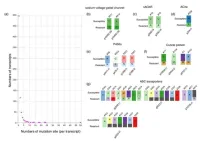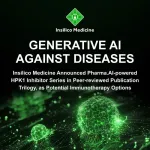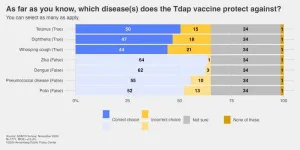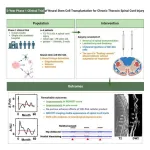(Press-News.org) Study shows how language, education and age affect someone’s ability to engage with digital health tools.
Digital health tools, such as patient portals, treatment apps and online appointment schedulers, are increasingly common. But not everyone is equally at home using them.
To find out how language, education and age may affect a person’s comfort in using digital tools, UC San Francisco researchers surveyed caregivers of hospitalized children at UCSF Benioff Children’s Hospitals.
The researchers found that being a Spanish speaker, having less education, and being older all made people feel less comfortable with digital health tools.
“Digital health tools are meant to improve health access and outcomes, but they must be useful for people from all backgrounds to avoid deepening existing health inequities,” said Naomi Bardach, MD, professor of pediatrics at UCSF Benioff Children’s Hospitals.
“We don’t want to leave people behind, whether they are older adults, people with lower education, or those of a specific race, ethnicity or language background.”
The study appears Dec. 17 in the Journal of the American Medical Informatics Association.
Comfort levels could affect treatment
Researchers asked how well people felt they could engage with digital tools, how motivated they were to use them, and how safe and in control they felt while they were using them. This was intended to measure people’s concerns about the privacy of digital health tools.
Education was the most important factor, after language. Having a high school education or less was most strongly associated with lower scores in all three areas measured.
Latinx and Black caregivers scored significantly lower on “feeling safe and in control” with digital tools. Rural caregivers, however, scored higher on the privacy measure, and they were more motivated to use digital tools.
Those over 45 were less motivated to use digital tools, and they also felt less safe and in control while using them. But they felt able to engage with them if they wanted to.
“Accessing these tools affects all kinds of things, like requesting medication refills online, tracking the number of steps per day, or helping a child play a therapeutic game for ADHD”, Bardach said.
“We all need to be thinking about how to make sure people can use them comfortably, and if they can’t, how to provide an alternative.”
Authors: Other UCSF authors include Stephen Crook, MD, Glenn Rosenbluth, MD, David V. Glidden, PhD, Alicia Fernandez, MD, Chuan-Mei Lee, MD, Lizette Avina, Leslie Magana, and Kiana Washington.
Funding: The work was funded by a grant from the Eunice Kennedy Shriver National Institute of Child Health and Human Development, (R01HD100393).
About UCSF: The University of California, San Francisco (UCSF) is exclusively focused on the health sciences and is dedicated to promoting health worldwide through advanced biomedical research, graduate-level education in the life sciences and health professions, and excellence in patient care. UCSF Health, which serves as UCSF's primary academic medical center, includes top-ranked specialty hospitals and other clinical programs, and has affiliations throughout the Bay Area. UCSF School of Medicine also has a regional campus in Fresno. Learn more at ucsf.edu, or see our Fact Sheet.
###
Follow UCSF
ucsf.edu | Facebook.com/ucsf | YouTube.com/ucsf
END
Young English speakers are most comfortable with digital health
2024-12-17
ELSE PRESS RELEASES FROM THIS DATE:
Study maps bed bugs’ genomes in unprecedented detail to find out why they just won’t die
2024-12-17
Scientists mapped near-gap-free and near-error-free genomes of a susceptible bed bug strain and a superstrain around 20,000 times more insecticide-resistant, offering the broadest look yet at the full scope of their resistance mutations.
Their findings were published in the journal Insects.
Although there is no evidence that bed bugs transmit diseases to humans, their bites can cause itchy rashes and secondary skin infections. Widespread use of insecticides, including the now-banned DDT, nearly wiped out populations of these blood-sucking insects by the 1960s, making infestations ...
SwRI awarded $26 million to develop NOAA magnetometers
2024-12-17
SAN ANTONIO — December 17, 2024 —NASA and the National Oceanic and Atmospheric Administration (NOAA) recently awarded Southwest Research Institute a $26 million contract to develop magnetometers for NOAA’s Space Weather Next (SW Next) program for two missions to be launched in 2029 and 2032. The magnetometers will measure the interplanetary magnetic field carried by the solar wind.
“The instruments provide critical data to NOAA’s Space Weather Prediction Center which issues forecasts, warnings and alerts that help mitigate space weather impacts,” said Dr. Roy Torbert, a program director in SwRI’s Earth, Oceans, and Space office ...
Being digitally hyperconnected causes ‘techno-strain’ for employees
2024-12-17
A new study has shown that employees are experiencing mental and physical techno-strain due to being ‘hyperconnected’ to digital technology making it difficult for people to switch off from work.
Researchers from the University of Nottingham’s Schools of Psychology and Medicine conducted detailed interviews with employees from a range of professions and found that the cognitive and affective effort associated with constant connectivity and high work pace driven by the digital workplace is detrimental to employee wellbeing. The results have been published today in Frontiers in Organizational Psychology.
This new paper is the final part of a research ...
Missing rebound: Youth drug use defies expectations, continues historic decline
2024-12-17
Image
Adolescent drug use continued to drop in 2024, building on and extending the historically large decreases that occurred during the pandemic onset in 2020.
"I expected adolescent drug use would rebound at least partially after the large declines that took place during the pandemic onset in 2020, which were among the largest ever recorded," said Richard Miech, team lead of the Monitoring the Future study at U-M's Institute for Social Research.
"Many experts in the field had anticipated that drug use would resurge ...
Announcing the 2024 Mcknight Brain Research Foundation Innovator Awards in Cognitive Aging and Memory Loss
2024-12-17
NEW YORK CITY and ORLANDO— The American Federation for Aging Research (AFAR) and the McKnight Brain Research Foundation (MBRF) are pleased to announce the 2024 recipients of The McKnight Brain Research Foundation Innovator Awards in Cognitive Aging and Memory Loss: Janine Kwapis, PhD, of Pennsylvania State University, and Sanaz Sedaghat, PhD, of the University of Minnesota.
Now in its fourth year, the Innovator Awards provide funding to research scientists pursuing groundbreaking studies in the field of cognitive aging.
Janine Kwapis, PhD, is an Assistant Professor and Paul Berg Early Career Professor ...
Study shows drop in use of antiviral medications in young children with influenza
2024-12-17
Despite national medical guidelines supporting the use of antiviral medications in young children diagnosed with influenza, a recent study reports an underuse of the treatment.
“Antiviral Use Among Children Hospitalized with Laboratory-Confirmed Influenza Illness: A Prospective, Multicenter Surveillance Study” was published in Clinical Infectious Diseases, the flagship journal of the Infectious Diseases Society of America.
Flu illness accounts for up to 10% of all pediatric hospitalizations during ...
Generative AI against diseases: Insilico Medicine announced Pharma.AI-powered HPK1 inhibitor series in peer-reviewed publication trilogy, as potential immunotherapy options
2024-12-17
Hematopoietic progenitor kinase 1 (HPK1), a member of the Ste20 serine/threonine kinases family, negatively regulates T cell function and is considered a promising target for immunotherapy. Despite the promising efficacy demonstrated in preclinical models, no HPK1 inhibitors are currently approved for clinical use, due to challenges including balance between kinase selectivity and pharmacokinetic properties.
CAMBRIDGE, Mass., Dec 17, 2024 --- Insilico Medicine (“Insilico”), a clinical-stage generative artificial intelligence (AI)-driven drug discovery company, is proud to announce its latest AI-powered ...
Cases of whooping cough growing, but knowledge about it is lacking
2024-12-17
PHILADELPHIA – Following a several-year lull during the pandemic, cases of whooping cough are increasing across the United States. As of Nov. 30, early U.S. data show over 28,000 cases reported this year, or six times as many as in the same period in 2023, according to the Centers for Disease Control and Prevention (CDC).
Whooping cough or pertussis, a highly contagious bacterial infection of the respiratory tract, was one of the most common childhood diseases in the 20th century and a major cause ...
Research alert: Neural stem cell transplantation shows promise for treating chronic spinal cord injury
2024-12-17
A Phase I clinical trial led by researchers at University of California San Diego School of Medicine has demonstrated the long-term safety and feasibility of neural stem cell transplantation for treating chronic spinal cord injuries. These devastating injuries often result in partial or full paralysis and are currently incurable. The study, which followed four patients with chronic spinal cord injuries for five years, found that two patients showed durable evidence of neurological improvement after treatment with neural stem cell implantation, including increased ...
Gruyère cheese, or a history of the domestication of bacteria
2024-12-17
The domestication of plants and animals has played a key role in the development of human societies. And microbes, too, have been tamed: a study by UNIL, published in the journal Nature Communications, shows that the bacteria used to produce Gruyère, Emmental and Sbrinz cheese show signs of ancient domestication.
The domestication of livestock and plants marked an important stage in the settlement of human populations in the Neolithic period, as they moved from a hunter-gatherer lifestyle to a subsistence model based on animal husbandry and agriculture. Because of the microscopic size and virtual absence of fossils ...






